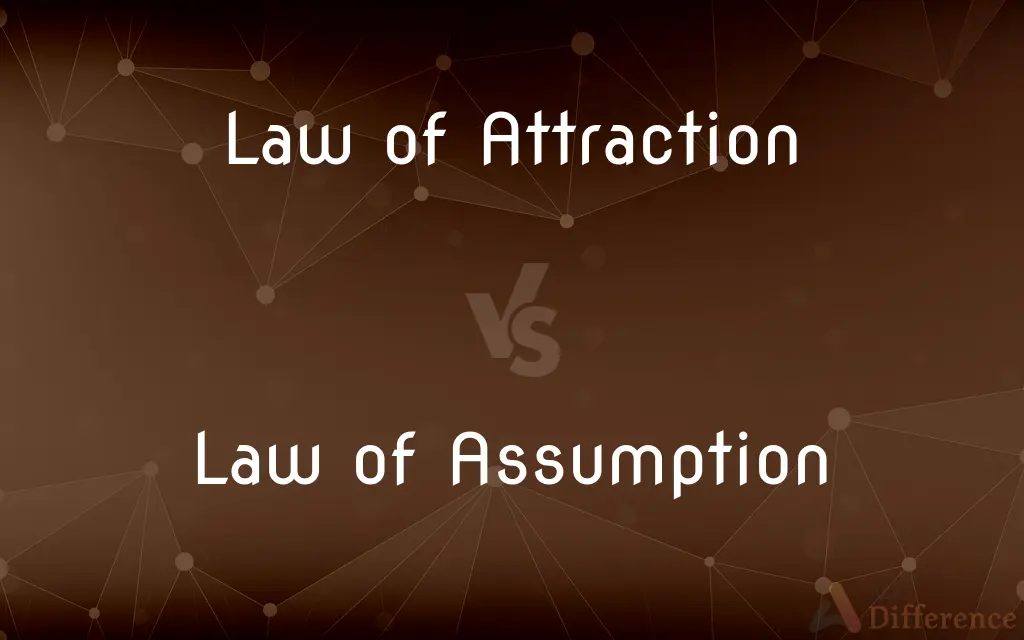Law of Attraction vs. Law of Assumption — What's the Difference?
By Tayyaba Rehman — Published on October 21, 2023
Law of Attraction posits thinking positively brings positive experiences, while Law of Assumption asserts assuming a desire’s fulfillment makes it reality. Both consider mental focus and attitude pivotal in determining life events.

Difference Between Law of Attraction and Law of Assumption
Table of Contents
ADVERTISEMENT
Key Differences
Law of Attraction and Law of Assumption, while integral to the paradigm of manifestation, showcase nuanced principles. The Law of Attraction emphasizes that like attracts like, purporting that focusing on positive or negative thoughts can bring comparable experiences into one's life. Conversely, the Law of Assumption takes a slightly divergent approach, emphasizing that assuming a certain outcome or circumstance essentially draws it into one’s existence.
When elucidating the underlying belief systems, the Law of Attraction and the Law of Assumption denote differing philosophical orientations. The Law of Attraction ostensibly leans on the energy and frequency emanating from thoughts and emotions, suggesting that these frequencies align with similar energies in the universe. In stark contrast, the Law of Assumption underscores a proactive mental stance, where belief in a certain outcome preempts and consequently engenders its manifestation.
Practical application offers a discernible divide between the Law of Attraction and Law of Assumption. The former typically involves visualizations, affirmations, and emotional alignment with desired outcomes, advocating for a mindset that magnetically pulls in those aspirations. Meanwhile, the Law of Assumption necessitates embodying the beliefs, feelings, and actions congruent with the desired outcome, acting 'as if' it has already materialized, thus propelling its realization.
In realms of popularity and mainstream recognition, Law of Attraction and Law of Assumption have sculpted differing profiles. The Law of Attraction has permeated popular culture and self-help domains, extensively dissected and analyzed through various books, workshops, and media. Alternatively, the Law of Assumption, though recognized, is oftentimes enveloped within or occasionally overshadowed by the overarching principles of the Law of Attraction.
Nonetheless, both Law of Attraction and Law of Assumption harmoniously converge on a singular axiom: the potent influence of mind and belief upon reality. Both acknowledge the intrinsic power of thought, emotion, and belief, asserting that these internal phenomena dynamically sculpt external reality. They differ, however, in mechanisms and methodologies, offering variant pathways to the manifestation of desires and outcomes.
ADVERTISEMENT
Comparison Chart
Focus
Thoughts and emotions
Assumptions and beliefs
Mechanism
Attracting like energies
Becoming to achieve
Application
Visualization and alignment
Acting ‘as if’
Popularity
Highly popular in mainstream media
Less recognized, often included in Attraction Law
Principle
Like attracts like
Assumed beliefs manifest reality
Compare with Definitions
Law of Attraction
An energetic resonance with desired outcomes.
The Law of Attraction posits vibrational alignment with desires facilitates their realization.
Law of Assumption
Assurance in desired outcomes becoming reality.
According to the Law of Assumption, assurance in recovery expedited his health improvement.
Law of Attraction
Manifesting desires through focused thought.
Via the Law of Attraction, envisioning success theoretically draws it nearer.
Law of Assumption
A method of embodying desired outcomes.
The Law of Assumption predicates that embodying wealth draws it into one’s life.
Law of Attraction
A psychological principle of experiential reflection.
The Law of Attraction suggests that negativity breeds further negative experiences.
Law of Assumption
A belief acting ‘as if’ preempts manifestation.
Employing the Law of Assumption, she lived as though her success was inevitable.
Law of Attraction
A universal principle of energetic magnetism.
The Law of Attraction believes in magnetizing desires through emotional and mental alignment.
Law of Assumption
A psychological tactic of preemptive belief.
The Law of Assumption theorizes that staunch belief in a career shift facilitates its occurrence.
Law of Attraction
A belief that like energies mutually attract.
The Law of Attraction asserts that positive thoughts draw positive events.
Law of Assumption
Manifesting by assuming desired results.
The Law of Assumption involves behaving as though goals have been achieved.
Common Curiosities
How does the Law of Attraction explain manifestation?
Law of Attraction suggests that like energies attract, influencing experiences based on thought patterns.
How does the Law of Assumption facilitate achieving goals?
Law of Assumption indicates assuming and acting as if a goal is already achieved propels its realization.
Does the Law of Assumption involve pretending?
Not pretending, but the Law of Assumption involves embodying beliefs and actions as if desires are already true.
How integral is belief in the Law of Assumption?
Extremely; the Law of Assumption fundamentally pivots on belief in assumed outcomes manifesting.
Can the Law of Attraction manifest physical items?
Proponents believe that the Law of Attraction can help manifest physical and experiential aspects alike.
Is the Law of Attraction scientifically proven?
The scientific community generally does not validate the Law of Attraction as scientifically proven.
Is the Law of Attraction focused on positive thinking?
Yes, the Law of Attraction emphasizes positive thoughts to attract positive outcomes.
Are visualization practices part of the Law of Attraction?
Yes, visualization is often utilized in the Law of Attraction to mentally align with desired outcomes.
Is the Law of Assumption recognized in psychology?
Not widely; the Law of Assumption is primarily discussed in metaphysical and self-help circles.
How does one start with the Law of Assumption?
Begin by consciously assuming and embodying the beliefs, emotions, and actions of desired outcomes.
Can the Law of Attraction change past events?
No, the Law of Attraction is generally understood as influencing future occurrences, not altering the past.
Does the Law of Assumption guarantee desired outcomes?
No, the Law of Assumption is a belief system and does not provide guaranteed results.
How quickly does the Law of Assumption work?
Timeframes are subjective and vary widely among practitioners of the Law of Assumption.
Can anyone practice the Law of Attraction?
Yes, anyone can practice the Law of Attraction, albeit with varying subjective experiences and results.
Can both laws, of Attraction and Assumption, be practiced simultaneously?
Yes, some individuals utilize both the Law of Attraction and Law of Assumption together in their manifestation practices.
Share Your Discovery

Previous Comparison
Enthalpy vs. Molar Enthalpy
Next Comparison
Foreign Trade vs. Foreign InvestmentAuthor Spotlight
Written by
Tayyaba RehmanTayyaba Rehman is a distinguished writer, currently serving as a primary contributor to askdifference.com. As a researcher in semantics and etymology, Tayyaba's passion for the complexity of languages and their distinctions has found a perfect home on the platform. Tayyaba delves into the intricacies of language, distinguishing between commonly confused words and phrases, thereby providing clarity for readers worldwide.














































